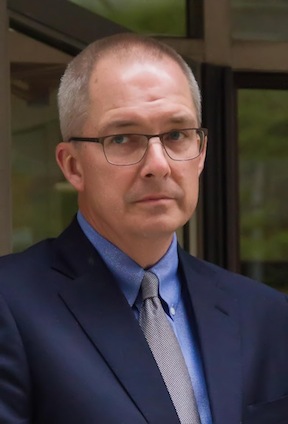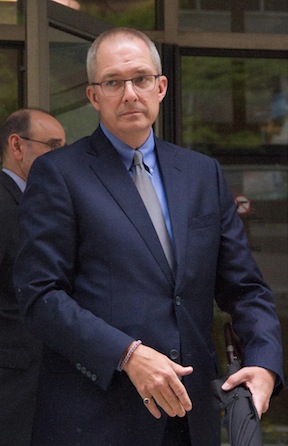Was the FBI’s textbook bribery scam an F Troop operation gone awry, with even the bureau’s own well-heeled lobbyists stealing from it? Or was it serious and praiseworthy undercover work? We don’t yet know.
There’s no bigger mystery in Pennsylvania government this week than questions surrounding the arrest and plea deal of John Estey, the former top aide to Gov. Ed Rendell, and Hershey Trust executive.
Federal prosecutors in recent weeks charged Estey with wire fraud for his theft of $13,000 from an undercover FBI bribery sting in 2011.
This Tuesday, May 10, Estey appeared in federal court in Harrisburg to plead guilty to the charges.
Those expecting answers to the mystery of Estey’s fall and prosecution were sorely disappointed by Estey’s court appearance.
Estey was preceded into the courtroom by a phalanx of lawyers and straight-laced men who looked to be FBI agents, and who sat in the back of the courtroom to watch Estey’s performance before the judge.
Estey himself came in to the courtroom in a low-key fashion, carrying an umbrella. He was dressed in a Philadelphia lawyer’s button-down blue suit, shirt and gray tie. He could easily have been mistaken for any other government lawyer in the room. It helped to remember that Estey himself at various times worked as a government lawyer.
Estey took a seat at the defense table, looking a decade older than his 53 years. His close-cropped hair was almost totally gray. Events appear to have taken a toll on him. At the defense table he propped his eyeglasses to his temples and reviewed papers before him in a lawyerly, workmanlike fashion.
Presiding Judge John E. Jones, of the federal Middle District Court of Pennsylvania, jauntily came into the courtroom and asked Estey if he understood the charges against him and the ramifications of his plea agreement with federal prosecutors.
Estey, standing before the judge, crisply said that he did.
“If I accept your plea today you’ll give up your right to trial,” Jones told him.
Estey unemotionally and matter-of-factly told the judge that he was guilty as charged.
Jones accepted the plea, and adjudicated Estey guilty. He released Estey on his own recognizance, pending an August 29 pre-sentencing hearing.
Sentencing guidelines suggest Estey could get probation, to six months in prison.
In the days before this week’s federal court plea hearing a few more details leaked out from court papers on the FBI sting that netted Estey.
In the late 2000s the FBI had set up a fake Florida-based company called Textbook Bio-Solutions. The FBI’s undercover company approached Estey in 2009 or 2010 for help to secure legislation in Pennsylvania to recycle old school textbooks into heating pellets, or to alternatively redistribute the school books to the needy in a plan to supposedly educate “the world through a textbook redistribution network.”
The faux company’s crude website further explained that its business, “Removes outdated and surplus textbooks from the State of Pennsylvania, which insures (sic) that they do not take up valuable space in rapidly filling Pennsylvania landfills.”
(For a company supposedly dealing with schoolbooks, no one appeared to notice that the grammar and spelling on the FBI website were atrocious).
But who could argue with such goals?
In 2009, the fake company hired the Harrisburg lobbying firm Long Nyquist to help pass enabling legislation to recycle textbooks. The fake company and an FBI agent posing as a company executive named John Miles began meeting with state legislators and passing around campaign contributions. The undercover feds spent at least $135,000 lobbying for the textbook legislation.
If nothing else, the undercover exercise shows how things are done in Harrisburg.
In 2010, the feds donated $5,000 to state Senate President Pro Joseph Scarnati’s political committee. Estey and John Miles meanwhile also gave state Rep. Dwight Evans $15,000.
Soon thereafter a Democrat state senator, Raphael Musto, introduced legislation to require textbooks be recycled to benefit Textbook Bio-Solutions. The bill passed the state senate unanimously, and with applause, in October 2010.
But the bill stalled in the House. In early 2011, Estey advised the fake company to spend another $20,000 in political contributions. Estey only doled out $7,000, and pocketed $13,000 of the money, leading to the criminal charge against him.
The sponsor of the failed senate bill, Raphael Musto, meanwhile left the senate under federal indictment for his role in another, apparently unrelated undercover FBI string. Musto died of cancer in 2014.
The FBI’s stealth textbook bill meanwhile was reintroduced in 2011 by Musto’s successor, Sen. John Yudichak, and again co-sponsored by Sen. Scarnati, and others.
But this time the bill never got out of Senate committee.
It seems by this time everyone may have wanted a seat on the textbook recycling company’s gravy train.
Plenty of questions remain.
Until his arrest, Estey was pulling in an annual salary at the Hershey Trust of $738,000 for various roles over the years, including legal counsel and executive vice president. The Hershey Trust promptly sacked Estey on April 29 upon learning of his arrest, and his admitted fraud.
Everyone seems to be asking: Why would Estey risk his high six-figure salary at the Hershey Trust — and his career, law license, freedom and reputation — to pocket a measly $13,000? For someone in his station it amounts to chump change, and not even a week’s salary.
That’s only one of the bigger outstanding mysteries of the slowly unwinding scandal.
Other challenging mysteries remain.
Such as, who else is involved, and what evidence does the government have against them?
What’s funny about the government’s “Textbook Bio-Solutions” scam is that this is pretty much how legislation is sponsored and written these days in Harrisburg.
Expensive television ads and wide-open campaign finance laws in Pennsylvania make the FBI’s scam textbook legislation just another textbook example of how laws are passed at the capitol, and why.
It’s all about the money, and campaign contributions, and not good policy.
This also partly explains why there has yet to be proper legislative hearings on any number of scandals in Pennsylvania involving children, like the Second Mile / Sandusky scandal, the Cash for Kids scandal, or the ongoing Hershey Trust scandal. These victimized kids simply don’t have money to spread around the legislature to hold hearings.
Lawmakers caught up in the unfolding Textbook Bio-Solutions scandal privately say they thought they really were voting on a textbook recycling program, and that it sounded like a good idea.
Which brings us back to John Estey.
Court documents suggest the FBI flipped Estey years ago, and that he’s been wearing a wire to record private conversations.
Those recordings, if they exist, could be part of future prosecutions.
But we didn’t learn about any of that at Estey’s plea hearing this week.
With just Estey and government lawyers before the court, it was like a tennis match without a net, or an opponent.
Was the FBI’s textbook bribery scam an F Troop operation gone awry, with even the bureau’s own well-heeled lobbyists stealing from it? Or was it serious and praiseworthy undercover work?
Those question will only be answered if others are prosecuted, and defense attorneys are given the opportunity to quiz Estey and the government’s use of him as a “cooperating witness.”
But at his plea hearing this week, Estey was as silent and cool as Calvin Coolidge.
But why arrest Estey now? Unmentioned at the hearing was the five-year statute of limitations for federal wire fraud. In April 2011 the undercover feds gave Estey $20,000. Five years later, as the statute was about to run out, the devil came to collect his due.
After his plea hearing John Estey walked out of the federal courthouse in Harrisburg into a gentle rain, looking as mysterious as a Sphinx, and as tight-lipped as George Washington on a dollar bill.
There’s a joke about a lawyer who sees a client about some matter, and afterwards he tells his client, “That’ll be one hundred dollars.” The client peels off a fresh hundred-dollar bill and hands it to the lawyer. After his client leaves, the lawyer notices he’s been given two hundred-dollar bills by mistake, stuck together. Which in the lawyer’s mind gives rise to an ethical dilemma: Should he tell his partner?
That’s also the big political question for John Estey, and others in Pennsylvania: When did John Estey tell his political patron and Ballard Spahr law partner, Gov. Ed Rendell, that he was working as an undercover FBI witness, and wearing a wire?
As John Estey walked from the federal courthouse into the rain, opening his umbrella, I asked him, “John, when did you tell Ed Rendell?”
The question appeared to register with him, and he flinched ever so slightly, but John Estey said nothing as he walked away into the rain.




Excellent article! When a reader absorbs this and other similar articles it becomes more and more believable that Ira Lubert and other old guard members of the PSU Board of Trust were involved in illicit and illegal behavior and perhaps did everything possible to convince the public the Sandusky/Second Mile scandal was a football problem.